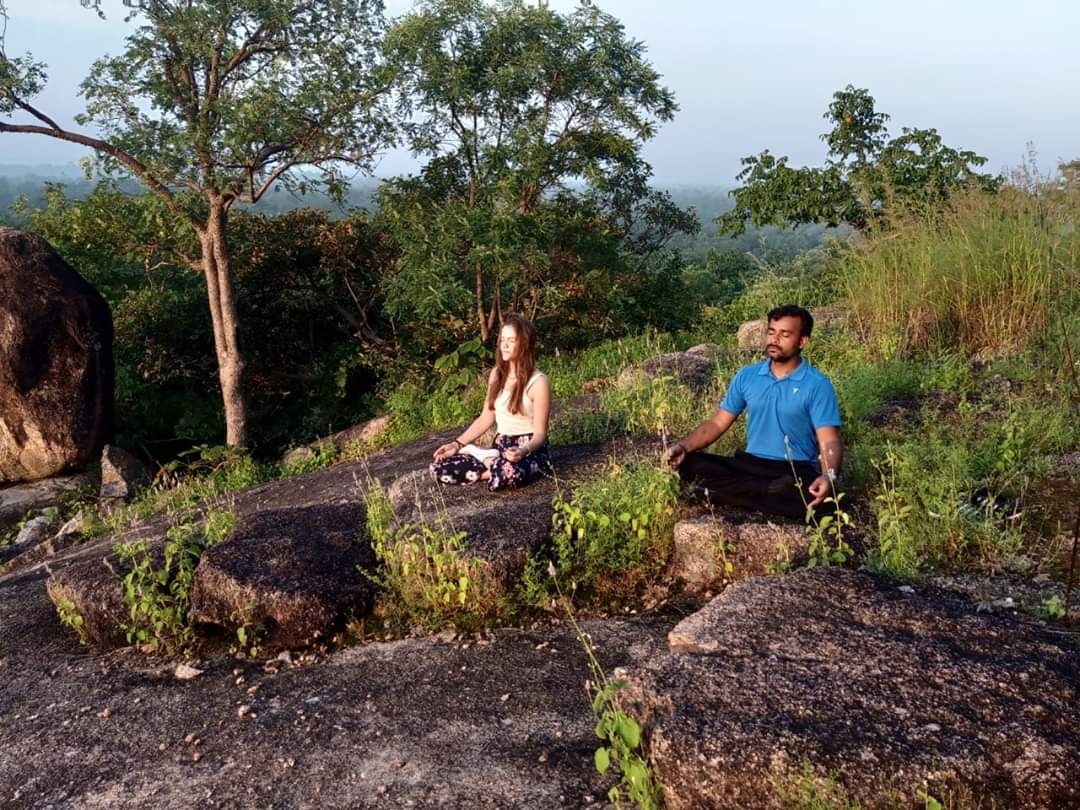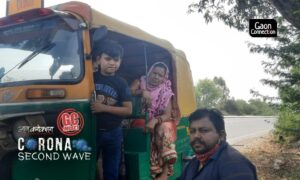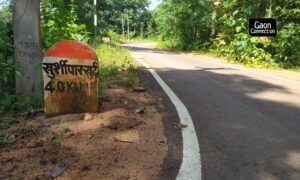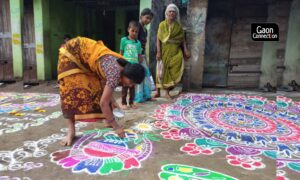Jabarra, a picturesque tribal village dotted with hills, lush forests and the scenic Kajal river in Dhamtari district of Chhattisgarh, is the first village in the state to get community forest rights. Last year, on August 20, its gram sabha (village council) was accorded community resource rights over 5,352 hectares (ha) forest. But, the success story of Jabarra does not end here.
The residents of the village are successfully running ecotourism by focusing on yoga, healing and wellness. Their unique initiative has attracted both national and international tourists, who have visited the village to experience an authentic rural living in nature’s lap. In the last six months, more than 1,200 tourists have visited Jabarra, which has a population of about 540 people. Through ecotourism the village has already earned Rs 3 lakh, Madhav Singh Markam, a resident of Jabarra told Gaon Connection.
“The day we secured rights over our vast forests, ecotourism was also launched in the village. Tourists from countries like Poland, Japan and Australia have visited us. In India, tourist groups have come from Kolkata, Pune and New Delhi,” he added.
Securing community forest resource rights has also led to the restructuring of Jabarra’s gram sabha (village council), which has further been empowered in the decision-making process. Getting rights over their forests was crucial for the villagers as majority of them depend on the forest and forest produce for their livelihood. There used to a lot of coupe (felling area) cutting in Jabarra by the forest department.
The village has 17 forest compartments (smallest unit of a forest). In five to six compartments, trees are sparse, and shagun and shisham trees have to be planted to arrest soil erosion. At present, the villagers are focusing on helping the forest regrow. Markam and a few more villagers had travelled to Mendha-Lekha village in Gadchiroli district of Maharashtra, the first village in the country to receive community forest rights, and stayed there for three days to learn important things about demanding rights over their forests.
The ecotourism project in Jabarra has been a hit right from the start. “The first batch of tourists arrived in August last year itself. But now, due to the lockdown, we are not accepting any bookings. We had to refuse tourists even from Raipur, the state capital,” said Markam.
The earnings through ecotourism are shared. “Ten per cent of our earnings from tourism is handed over to the gram sabha. The rest goes to the 20-member group that guides travellers and shows them around,” he added.
“Our forefathers fought for rights over the forest. Now, we want to carry forward our new identity of ecotourism,” Ram Kumar Ilma, secretary of Jabarra gram sabha told Gaon Connection.
Former collector of Dhamtari, Rajat Bansal, who played a proactive role in the entire process said securing community forest rights has changed the entire outlook of Jabarra residents. “Villagers have become the owners of forest resources. Responsible ecotourism, which upholds local social and cultural values as well as festivals, will not be demand driven. There will always be flexibility regarding the number of tourists per season,” he said.
Right now, Arya Prerna Samiti, a non-profit based in Jagdalpur that specialises in community tourism across Chhattisgarh, helps the Jabarra gram sabha with bookings. “We conducted a lot of initiatives and many foreigners visited Jabarra. We do a recce and see what can be done in a particular place. Thereafter, we train local people in tourism activities,” Mohit Arya, founder of Arya Prerna Samiti told Gaon Connection. “Jabarra is a different concept and is being developed as a wellness tourism hub,” he added.
The trainers of his non-profit lend voluntary support to the 20-member group in Jabarra. “We want people to connect with the nature. Our volunteers conduct sound therapy by taking them inside the forest, arranging for traditional games near the river, and conducting treks and informing visitors about medicinal plants and herbs available in the village,” said Arya. Jabarra has over 80 types of medicinal plants and a local healers’ group called the Jabarra Healers’ Group.
Boosting farming and securing livelihoods
Apart from ecotourism, there is a strong focus on improving the livelihood options of the residents of Jabarra through cultivation. Dharm Singh, assistant project officer, MGNREGA [Mahatma Gandhi National Rural Employment Guarantee Act], Dhamtari said work under natural resource management planning is going on.
“For creation of assets in Jabarra, we are planning afforestation drives, restoration of dabris [farm ponds], river rejuvenation work and treatment of SC/ST lands with the help of the land resources department. We are also considering forest resources and see what can be done and preparing a working plan,” Singh told Gaon Connection.
The state machinery is working with the gram sabha. According to Markam, every decision related to the village is taken at the monthly gram sabha meeting. When the gram sabha assembles, the villagers invite officials from all the government departments, too.
“This year, we are planning to sow dubraj, an indigenous rice variety, over 15 acres and dig talaabs [ponds] through MGNREGA. We are also planning a gauthan (cow shed) in the village. We do not need to go outside our village in search for work. MGNREGA activities have picked up after ecotourism set in,” said Markam.
Creating dabris (farm ponds) under MGNREGA is a welcome move. “A large number of villagers were unable to cultivate their lands because of lack of irrigation. Dabris will ensure water availability,” Shibam Jha of PRADAN, a non-profit that works for vulnerable communities across India, told Gaon Connection. “Villagers used to grow paddy, but now there is a plan to grow vegetables and pulses, too. Last year, farmers also grew millets,” he added.
PRADAN has been helping strengthen the gram sabha after Jabarra secured community forest rights. “Ownership over 5,352 hectares forest area is a huge achievement. Now, the gram sabha’s role becomes very vital,” Masroor Ahmad, team coordinator with PRADAN told Gaon Connection.
Future plans
Though ecotourism is catching up in a big way, Jabarra remains a remote village that shares its border with Gariyaband, one of the 90 districts in the country affected by Left-wing extremism. It has poor mobile connectivity even though roads are being constructed to help boost ecotourism.
Approximately Rs 20-22 lakh has been sanctioned for building toilets and home stays for tourists. An old forest rest house is being reconstructed, too. Plans are afoot to introduce solar-power irrigation in the village. Solar lights are already installed in the village. At the home stays, tourists are offered authentic local food served on leaf-plates. Plastics use is banned.
Apart from ecotourism and MGNREGA works, Jabarra is also a part of the Centre’s Van Dhan Scheme that aims at livelihood generation of vulnerable tribal populations through sale of minor forest produce. PRADAN has imparted training to six women self-help groups (SHGs) on this matter and these women groups play an important role in collection of forest produce such as tendu leaves. A total of 18 minor forest produce items are traded in Chhattisgarh. It is estimated that on an average, a tribal family in the state earns Rs 1-1.5 lakh in a year from the collection and sale of the minor forest produce.
At present, 97 self-help groups in Nagari block, in which Jabarra is situated, are involved in the collection of non-timber forest products that are stored and sold when the prices go up.
According to Ahmad, about 10,000 people have got individual forest rights in Dhamtari district, but Jabarra is the only village to get community forest rights.



















